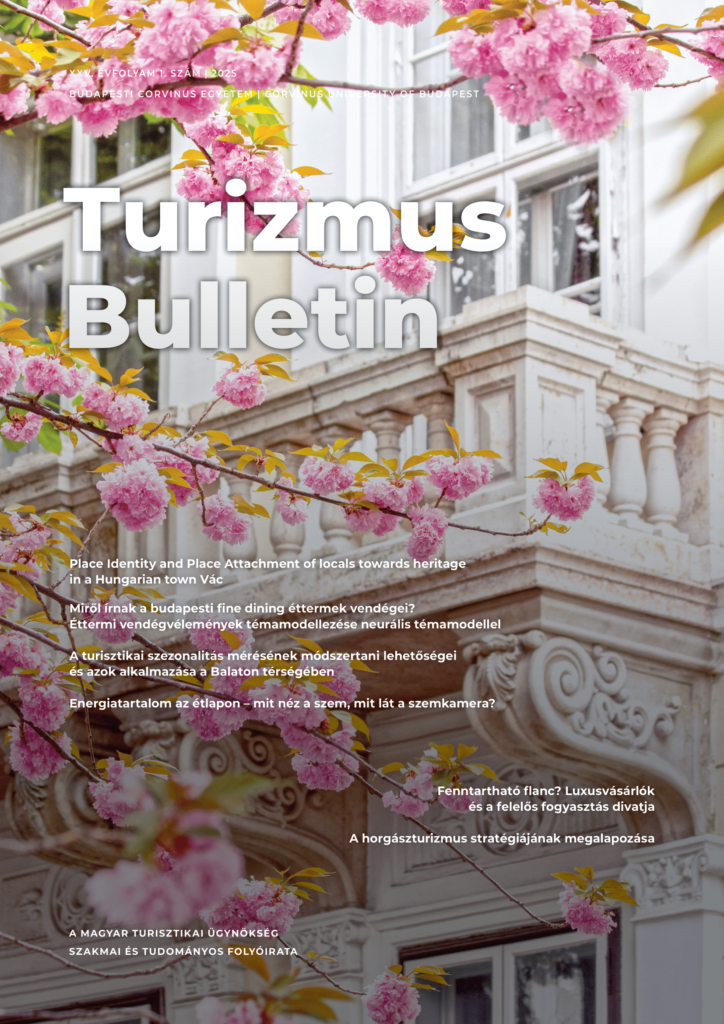Sustainable Chic? Fancy shoppers and responsible consumption
DOI:
https://doi.org/10.14267/TURBULL.2025v25n1.5Keywords:
luxury, sustainability, attitude-scale, luxury costumerAbstract
The study focuses on sustainable luxury and on luxury consumers’ attitudes towards sustainability. In addition to the overview of the relationship between the concepts of luxury and sustainability, good practices of the importance of sustainability for luxury brands are also presented. In the related quantitative research, the authors surveyed luxury consumers’ sustainability attitudes and purchasing habits. The results revealed a generally positive attitude towards sustainability among luxury consumers, which is reflected in the purchase of second-hand products and their long-term use. The main conclusion of the study is that luxury brands can rely more on their communication of sustainability, as this is not only a fashion trend but a real demand on the part of their customers.
References
ACHABOU, M. A. – DEKHILI, S. (2013): Luxury and sustainable development: Is there a match? Journal of Business Research. 66(10). pp. 1896–1903. https://doi.org/10.1016/j.jbusres.2013.02.011
AGGARWAL, E. – SINGH, A. B. – MISRA, R. (2024): Does consumption values and ascribed responsibility predict attitudes towards sustainable luxury brands. Journal of Consumer Marketing. 41(2). pp. 180–195. https://doi. org/10.1108/JCM-05-2023-6058
AKROUT, H. – GUERCINI, S. (2022): Sustainability in fashion and luxury marketing: Results, paradoxes and potentialities. Journal of Global Fashion Marketing. 13(2). pp. 91–100. https://doi. org/10.1080/20932685.2021.2017320
ALGHANIM, S. – NDUBISI, N. O. (2022): The Paradox of Sustainability and Luxury Consumption: The Role of Value Perceptions and Consumer Income. Sustainability. 14(22). 14694. https://doi.org/10.3390/su142214694
AMATULLI, C. – DE ANGELIS, M. – DONATO, C. (2021): The atypicality of sustainable luxury products. Psychology & Marketing. 38(11). pp. 1990–2005. https://doi.org/10.1002/mar.21559
ARRIBAS-IBAR, M. – NYLUND, P. A. – BREM, A. (2022): Circular business models in the luxury fashion industry: Toward an ecosystemic dominant design? Current Opinion in Green and Sustainable Chemistry. 37. 100673. https://doi. org/10.1016/j.cogsc.2022.100673
BIASUTTI, M. – FRATE, S. (2017): A validity and reliability study of the Attitudes toward Sustainable Development scale. Environmental Education Research. 23(2). pp. 214–230. https:// doi.org/10.1080/13504622.2016.1146660
CHANDIRAN, G. K. (2021): Luxury branding: What it takes to be recognised as a luxury brand? MSc Dissertation. Bournemouth University, United Kingdom.
CHANG, W.-Y. – TAECHARUNGROJ, V. – KAPASUWAN, S. (2022): Sustainable Luxury Consumers’ Preferences and Segments: Conjoint and Cluster Analyses. Sustainability. 14(15). 9551. https://doi.org/10.3390/su14159551
DEVANATHAN, S. (2023): Tracing the Characteristics and Consequences of Luxury Through a Review of Literature. International Journal of Professional Business Review. 8(11). e03870, pp. 1–20. https://doi.org/10.26668/ businessreview/2023.v8i11.3870
DIJKSTRA, E. M. – GOEDHART, M. J. (2012): Development and Validation of the ACSI: Measuring Students’ Science Attitudes, Pro Environmental Behaviour, Climate Change Attitudes and Knowledge. Environmental Education Research. 18(6). pp. 733–749. https:// doi.org/10.1080/13504622.2012.662213
GUMMERUS, J. – VON KOSKULL, C. – KAUPPINEN-RÄISÄNEN, H. – MEDBERG, G. (2023): Who creates luxury? Unveiling the essence of luxury creation through three perspectives: A scoping review. Qualitative Market Research. 27(2). pp. 180–211. https://doi. org/10.1108/QMR-02-2023-0025
HOLMQVIST, J. – WIRTZ, J. – ISSANDOU, A. (2023): Research Note: Conceptualizing Agentic Luxury in Luxury Services. Journal of Services Marketing. 37(9). pp. 1113–1119. https://doi. org/10.1108/JSM-07-2023-0283
KUNZ, J. – MAY, S. – SCHMIDT, H. J. (2020): Sustainable luxury: Current status and perspectives for future research. Business Research. 13(2). pp. 541–601. https://doi. org/10.1007/s40685-020-00111-3
LUMING, Z. – PENG, J. – YU, S. L. (2023): Sustainable Luxury and Consumer Purchase Intention: A Systematic Literature Review. SAGE Open. 13(4). https://doi.org/10.1177/21582440231216285
SESTINO, A. – AMATULLI, C. – DE ANGELIS, M. (2021): Consumers’ Attitudes Toward Sustainable Luxury Products: The Role of Perceived Uniqueness and Conspicuous Consumption Orientation. In: Gardetti, M. Á. – Muthu, S. S. (eds): Handloom Sustainability and Culture. Springer Nature Singapore. pp. 267–279. https:// doi.org/10.1007/978-981-16-5967-6_12
VEBLEN, T. (1975): A dologtalan osztály elmélete. Közgazdasági és Jogi Könyvkiadó, Budapest.
YANG, H. – SU, X. – SHION, K. (2023): Sustainable luxury purchase behavior in the Post-Pandemic Era: A grounded theory study in China. Frontiers in Psychology. 14. 1260537. https://doi. org/10.3389/fpsyg.2023.1260537
ZWICKLE, A. – JONES, K. (2018): Sustainability Knowledge and Attitudes – Assessing Latent Constructs. In: Filho, W. L. – Marans, R. W. – Callewaert, J. (eds): Handbook of Sustainability and Social Science Research, World Sustainability Series. pp. 435–451. https://doi.org/10.1007/978- 3-319-67122-2_25

